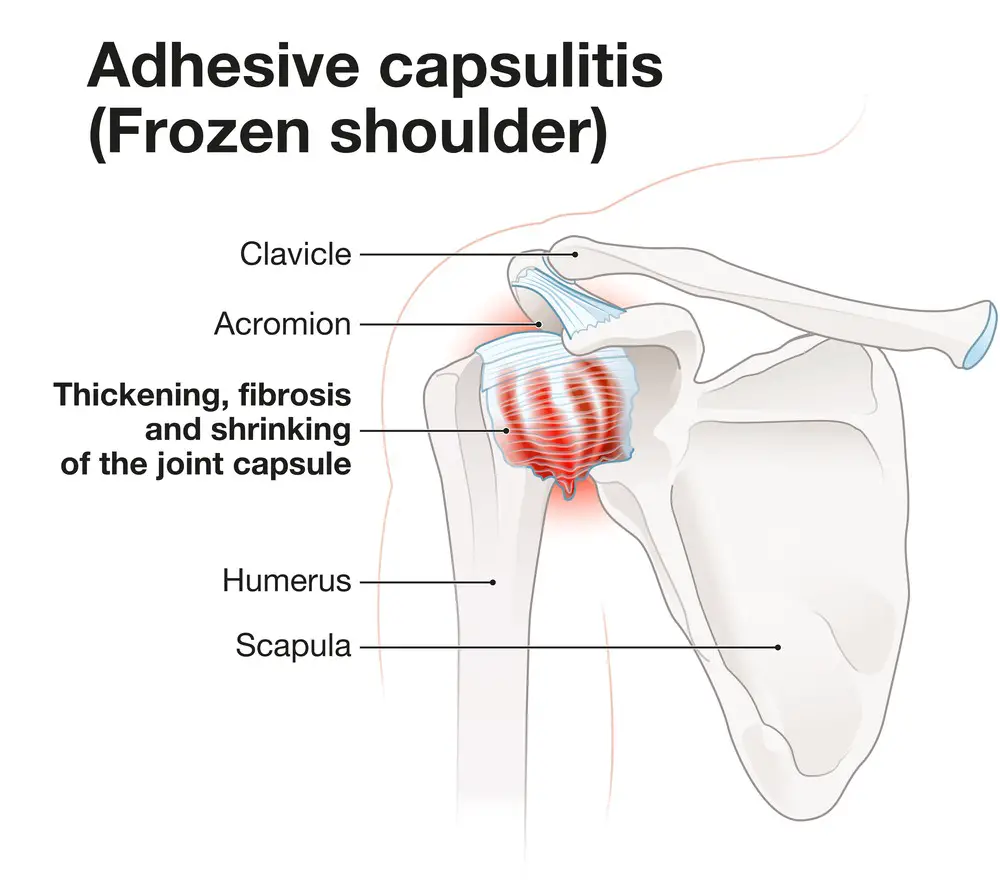As a BetterHelp affiliate, we receive compensation from BetterHelp if you purchase products or services through the links provided
Dealing with a frozen shoulder can be a painful and frustrating experience, especially when getting a good night’s sleep. A frozen shoulder, or adhesive capsulitis, is a condition characterized by stiffness and discomfort in the shoulder joint, making it difficult to move and perform daily activities. This article aims to help you understand how to sleep comfortably with a frozen shoulder, providing helpful tips and strategies to improve your sleep quality.
One of the major challenges of having a frozen shoulder is finding the right sleeping position that minimizes pain and discomfort. A comfortable position helps you to fall asleep faster, ensures more restful sleep, and reduces the chances of worsening the condition. In the following sections, you’ll learn about various exercises, medical interventions, and prevention tactics to help manage your frozen shoulder symptoms and enhance overall well-being.
Key Takeaways
- Discover the impact of the frozen shoulder on your sleep and learn how to find a comfortable position
- Explore exercises and medical treatments that can help alleviate pain and improve sleep quality
- Learn about prevention strategies to minimize the risk of developing a frozen shoulder in the future
 Understanding Frozen Shoulder
Understanding Frozen Shoulder
Frozen shoulder, also known as adhesive capsulitis, is a condition that affects the shoulder joint, causing pain, stiffness, and limited range of motion. There are three stages in the frozen shoulder development: the freezing stage, the frozen stage, and the thawing stage.
Freezing Stage
During the freezing stage, you may gradually experience shoulder pain and progressively worsening stiffness. This is due to the thickening and tightening of the shoulder capsule. The freezing stage can last anywhere from 6 weeks to 9 months.
Frozen Stage
The frozen stage is marked by decreased pain, while stiffness and reduced shoulder mobility remain. Or, you might experience a constant, dull pain in your shoulder. This stage can last from 4 months to a year.
Thawing Stage
In the thawing stage, the shoulder slowly regains its range of motion. The pain subsides, and you can gradually return to your normal activities. This stage can last from 6 months to 2 years.
When dealing with a frozen shoulder, it’s important to remember that:
- The exact cause of adhesive capsulitis is still unknown.
- Certain factors, such as diabetes, thyroid disorders, or a previous shoulder injury, can increase your risk of developing a frozen shoulder.
- Seeking medical advice as soon as symptoms emerge can help improve your recovery.
Now that you understand the stages of a frozen shoulder and the factors that can contribute to its development, it’s time to learn strategies to manage this condition and improve your sleep quality.
Causes of Frozen Shoulder
Having a frozen shoulder can be a real pain, but understanding the causes can help you find the proper treatment. This section will explore some common reasons you might have a frozen shoulder.
Inflammation is one of the key players in the development of a frozen shoulder. When the connective tissue in your shoulder becomes inflamed, it thickens and tightens, limiting your shoulder’s range of motion. Various factors, such as overuse, injury, or autoimmune response, can cause this.
Certain underlying health conditions may also contribute to the development of a frozen shoulder. For instance, diabetes is known to increase the risk of experiencing this condition. High blood sugar levels can damage the collagen, making the connective tissue in your shoulder stiff and less mobile.
Another cause of a frozen shoulder is immobility for extended periods. Maybe you had an injury like a rotator cuff tear that caused you to keep your shoulder still for a prolonged duration. Or perhaps you had a stroke or a neurological condition like Parkinson’s that impacted your ability to move your arm. In either case, the lack of movement in your shoulder can trigger the development of a frozen shoulder.
Sometimes, a rotator cuff injury may lead to a frozen shoulder. The rotator cuff, composed of muscles and tendons, helps keep your shoulder joint stable and allows for a wide range of movements. An injury to this area can result in scar tissue formation, leading to restricted movement and a frozen shoulder.
To sum up, here’s what we’ve covered:
- Inflammation can cause thickening and tightening of shoulder connective tissue
- Diabetes, due to its collagen-damaging effects, can increase the risk of frozen shoulder
- Immobility from injuries or neurological conditions might contribute to a frozen shoulder
- Rotator cuff injuries can lead to scar tissue formation and restricted movement
Remember that understanding your frozen shoulder’s cause is crucial for finding the right treatment. With this information, you’ll be better equipped to discuss your condition with your healthcare professional and take the necessary steps toward recovery.
Symptoms to Look Out For
If you’re struggling to sleep with a frozen shoulder, it’s essential to recognize the symptoms causing discomfort. This will help you better understand what you’re going through and find ways to alleviate the pain.
Pain is one of the main symptoms you might experience when dealing with a frozen shoulder. This can be a dull, persistent ache in your shoulder, making it difficult to find a comfortable sleeping position. Sometimes, this pain can even radiate to the upper arm and neck.
In addition to pain, you might also notice discomfort when you try to move your arm. This could be due to the shoulder joint’s inflammation and scar tissue formation. As you move, the scar tissue can cause stiffness and restrict your range of motion.
Keep an eye out for other symptoms like fever. Although rare, it can be a sign of an infection or a more serious medical condition. If you have a fever or notice any redness and warmth around the shoulder joint, it’s essential to seek medical attention.
To summarize, here are the key symptoms to look out for when dealing with a frozen shoulder:
- Pain in the shoulder, sometimes radiating to the arm and neck
- Discomfort when moving the arm
- Stiffness and restricted range of motion
- Possible fever and signs of infection
Attention to these symptoms will help you better manage your frozen shoulder while trying to sleep and ensure you’re taking the proper steps toward recovery. Don’t hesitate to contact a healthcare professional if you’re unsure or concerned about your condition.
The Connection Between Frozen Shoulder and Sleep
Dealing with a frozen shoulder can be a real pain, and it might cause you to lose precious hours of quality sleep. You might wonder how a frozen shoulder impacts your sleep patterns and why sleep is crucial for healing and recovery. Let’s explore the connection and look at tips to help you sleep better.
Frozen shoulder, also known as adhesive capsulitis, causes stiffness and a reduced range of motion in your shoulder. This condition can make finding a comfortable sleeping position challenging, leading to tossing, turning, and even insomnia. But don’t worry – there are ways to tackle this issue and help you get a good night’s sleep.
Stress is a significant factor in both sleep quality and frozen shoulder. When stressed, your sleep pattern can be disrupted, and a lack of sleep might trigger more stress. This vicious cycle not only exacerbates your frozen shoulder symptoms but can also negatively impact your lifestyle.
Taking control of your sleep health is essential when healing from a frozen shoulder. Quality sleep allows your body to rest and repair, speeding up recovery. Follow these strategies to help improve your sleep quality:
- Create a sleep-friendly environment by removing distractions and adding comfortable pillows and blankets.
- Establish a consistent bedtime routine to signal your body that it’s time for sleep.
- Practice relaxation techniques like deep breathing or meditation to calm your mind and ease stress.
Your lifestyle also plays a critical role in your sleep quality and recovery from a frozen shoulder. Embrace these habits to foster a better relationship between sleep and your condition:
- Stay active during the day, but do not overwork your shoulder.
- Eat a balanced diet with plenty of fruits, vegetables, lean proteins, and whole grains.
- Manage your stress levels by engaging in activities you enjoy, spending time with loved ones, or seeking professional help.
Don’t let your frozen shoulder steal your sleep away. Following these tips and adjusting to your lifestyle can improve your sleep quality and support your body’s healing process.
 How to Sleep Comfortably with Frozen Shoulder
How to Sleep Comfortably with Frozen Shoulder
Suffering from a frozen shoulder? Don’t worry; you can still have a good night’s sleep. Here are some tips to help you sleep comfortably with a frozen shoulder.
First, let’s explore some sleeping positions that might ease your discomfort. Trying different sleep positions can help reduce the pressure on your painful shoulder.
- Side sleeper: If you’re a side sleeper, try sleeping on the opposite side of your frozen shoulder. A body pillow between your knees can help align your spine and reduce strain on your non-affected shoulder.
- Back sleeper: If you prefer lying on your back, place a pillow beneath your affected arm, providing gentle support. This can help maintain a comfortable angle for your shoulder joint and minimize pain during the night.
- Stomach sleeper: While this position is not generally recommended for those with a frozen shoulder, you can try placing a small pillow underneath your chest and shoulder area to create some elevation, potentially reducing the pressure on your shoulder joint.
Remember to keep your head well-supported with a comfortable pillow, ensuring your neck is in a neutral position.
In addition to adjusting your sleep position, you can modify your nighttime routine to improve your overall sleep quality.
- Manage your pain: Taking over-the-counter pain relievers like ibuprofen or applying a cold pack to your shoulder for 15-20 minutes before bedtime can help minimize the pain.
- Implement relaxation techniques: Engage in activities such as deep breathing exercises, gentle stretching, or meditation to soothe your mind and body before settling in for the night.
- Optimize your sleep environment: Create a cozy, dark, and quiet space without distractions. Adjust the room temperature to a comfortable level, ensuring that your bed and pillows are supportive.
The key takeaway is that while a frozen shoulder can be uncomfortable, combining sleep position adjustments, pain management, and relaxation techniques can help you ease the discomfort and get a good night’s sleep. Sweet dreams!
Exercises for Frozen Shoulder Relief Before Bed
Living with a frozen shoulder can be a pain, especially when you’re trying to get some rest. Fortunately, you can try a few exercises before bed to help alleviate that discomfort and improve your sleep. Remember, it’s essential to consult with a healthcare professional or physical therapist before attempting any new exercises.
Gentle range-of-motion exercises: One effective strategy is to perform slow, controlled circular movements with your shoulder. Stand near a wall for support, and gently swing your arm in small circles. Gradually increase the size of the circles as your range of motion improves. Try doing them both clockwise and counterclockwise for about a minute each.
Pendulum exercise: Another exercise to consider is the pendulum. Lean forward slightly, letting your affected arm hang down, and use your other hand for support on a table or chair. Gently swing your arm back and forth, side to side, and in circular motions. Aim for 10 to 15 repetitions for each direction.
Cross-body reach: This simple stretching exercise can help improve flexibility. Hold the elbow of your affected arm with your opposite hand, then gently pull your arm across your chest until you feel a gentle stretch. Hold for 15 to 20 seconds, then release. Repeat 3 to 5 times on each side.
Incorporate deep-breathing exercises throughout these movements. This can help you relax as you prepare your body for sleep. Take a slow, deep breath in through your nose while counting to four, then exhale fully through your mouth over a four-count. Repeat a few times, focusing on your breath’s rhythm.
These exercises can make a difference in helping you get a good night’s sleep despite your frozen shoulder. Consistency is key, so do your best to incorporate them into your bedtime routine!
Medical Interventions for Pain and Sleep Improvement
Getting proper sleep can be challenging when you’re struggling with a frozen shoulder. Fortunately, various medical interventions are available to help alleviate pain and improve sleep quality.
Medications
Over-the-counter medications like ibuprofen and aspirin effectively reduce inflammation and provide pain relief. They’re widely available, easy to use, and can make a difference for your frozen shoulder. Remember to follow the dosage recommendations and consult your doctor if you’re unsure about any medication.
Steroid Injections
Corticosteroids, like steroid injections, can help reduce inflammation in the shoulder joint. While they may not remove all the pain, they can significantly alleviate discomfort and make it easier to rest at night. Talk to your doctor about whether corticosteroid injections are right for you.
Pain Medications
If over-the-counter medications aren’t providing enough relief, your doctor might prescribe stronger pain medications. While these drugs can be beneficial, use them cautiously, as they may have potential side effects. Make sure to follow your doctor’s instructions carefully.
Nerve Stimulation
A lesser-known treatment, nerve stimulation, can relieve frozen shoulder pain. This method involves sending electrical pulses to the nerves around the shoulder, which can help reduce discomfort. If traditional methods aren’t working for you, ask your doctor about exploring nerve stimulation as a potential therapy.
Medical interventions for a frozen shoulder include over-the-counter anti-inflammatory medications like ibuprofen and aspirin, steroid injections, prescription pain medications, and nerve stimulation. Always consult a healthcare professional before starting any new treatment. With the right approach, you’ll hopefully experience improved sleep quality and wake up feeling refreshed.
Considering Surgical Options
If you’re struggling to sleep with a frozen shoulder and conservative treatments haven’t provided relief, it’s time to consider surgical options. Don’t worry. We’ve provided information on what to expect when exploring these avenues.
One surgery option is arthroscopic surgery, which is a minimally invasive procedure. To perform this surgery, an orthopedic surgeon makes small incisions in your shoulder and uses tiny instruments to remove scar tissue or adhesions. This can help increase your range of motion and decrease pain, making sleep more comfortable.
Before diving into surgery, it’s essential to consult with your GP and an orthopedic surgeon. They can provide expert advice and determine if surgery is the best course of action for your situation. Remember, surgery should always be considered a last resort after exploring less invasive treatments.
When looking for a surgeon, reputable institutions like the Mayo Clinic are great sources to consider. They have experienced orthopedic surgeons specializing in treating frozen shoulders and other related conditions. Talk to more than one surgeon for different opinions and weigh the risks and benefits of each surgical option.
Here’s a quick rundown of things to consider when exploring surgical options:
- Consult with your GP and an orthopedic surgeon
- Research reputable institutions and surgeons
- Weigh the risks and benefits of each option
- Surgery should be a last resort
Surgery might seem daunting, but if conservative treatments aren’t working, it could be the key to getting a good night’s sleep and improving your overall quality of life. Remember, the main goal is to regain mobility and reduce pain; surgery can sometimes provide a more effective solution. Keep an open mind and explore all treatment options with the help of your healthcare professionals.
Key Takeaway: Arthroscopic surgery is a potential option for frozen shoulder sufferers who cannot find relief through conservative treatments. Consulting with a GP and an orthopedic surgeon and researching reputable institutions can guide you toward the best course of action.
Awareness and Prevention of Frozen Shoulder
Sometimes, having a frozen shoulder can make sleeping a real pain. However, knowing how to prevent this issue and making lifestyle adjustments can help you rest easier. In this section, we’ll share some tips to reduce your risk of developing a frozen shoulder and how to sleep better if you’re experiencing it.
One of the primary ways to prevent a frozen shoulder is to stay active. Regular exercise can keep your shoulder joints flexible and maintain your overall health. Working with a physical therapist is also an excellent option, as they can guide you through specific stretches and movements to keep your shoulder in tip-top shape.
Lifestyle changes can also make a difference. Keeping an eye on your posture and making conscious adjustments throughout the day will improve the condition of your shoulder muscles. For example, avoid crossing your arms, hunching, or remaining in one position for long periods.
Here’s a quick list of dos and don’ts for the prevention of frozen shoulder:
- Do: Stretch regularly, maintain good posture, exercise regularly
- Don’t: Hunch your shoulders, cross your arms, stay in one position for too long
Applying heat and cold to the affected area helps alleviate pain and promote healing. Switching between a heating pad and a cold compress can reduce inflammation and loosen tight shoulder muscles. Just remember to avoid applying heat or cold directly to the skin – use a cloth as a barrier to protect yourself from burns or frostbite.
As for sleeping with a frozen shoulder, finding a comfortable position is crucial. Here are a few strategies to maximize comfort:
- Prop pillows around you to support the affected shoulder
- Try sleeping on your back with a pillow under your arm
- Experiment with a reclining chair or propping yourself up with additional pillows
Key Takeaway: Regular exercise, proper posture, and a balanced mix of heat and cold therapy effectively prevent frozen shoulder and manage discomfort. With these modifications, you can improve your sleep quality and get the rest you deserve.
Conclusion
You’ve learned some practical techniques to help you sleep with a frozen shoulder. With pain management, supportive pillows, and adjusting your sleep environment, better rest is within reach.
Remember to keep track of your progress and stay consistent with the approaches that work for you. Whether it’s using over-the-counter pain relief, employing heat or cold therapy, or practicing relaxation techniques before bedtime, consistency is key.
Don’t forget the importance of a cozy sleep environment. Adjust the room temperature to your preference, eliminate noise and light distractions, and invest in a high-quality mattress and pillows. Consider seeking a healthcare professional’s advice if your condition does not improve or worsens over time.
Embracing these tips and making minor adjustments to your bedtime routine will ultimately lead to more restful nights, better days, and, hopefully, a faster recovery from your frozen shoulder. So go ahead, give these strategies a try, and start enjoying a good night’s sleep!
Frequently Asked Questions

What is the best sleeping position for frozen shoulder?
Try sleeping on your back to ensure a good night’s sleep with a frozen shoulder. This position avoids putting pressure on the affected shoulder, helping minimize any discomfort. You may also consider placing a small pillow under your arm for support and elevation. Here’s a key takeaway: sleeping on your back with a supportive pillow can help alleviate pain from a frozen shoulder.
How can I alleviate nighttime pain from frozen shoulder?
To ease nighttime pain from a frozen shoulder, follow these tips:
- Apply a warm or cold pack to your shoulder before bed to reduce inflammation and pain.
- Take over-the-counter pain relievers, such as ibuprofen, as needed.
- Stretch your shoulder gently before bed, or try deep breathing exercises to relax your muscles.
- Keep your affected arm elevated with a supportive pillow.
Which pillow should I use for sleeping with a frozen shoulder?
A contoured or orthopedic pillow can support your neck and shoulder. Look for a pillow to accommodate your sleeping position (side or back) and align your neck with your spine. This helps reduce unnecessary strain on your shoulder, making sleeping with a frozen shoulder easier.
Are there any home remedies to quicken frozen shoulder recovery?
Home remedies can help speed up the recovery process for a frozen shoulder. Here are some strategies:
- Apply heat or cold packs to the shoulder at regular intervals.
- Use over-the-counter anti-inflammatory medications, such as ibuprofen.
- Engage in gentle stretches and range-of-motion exercises as recommended by your healthcare provider.
- Consider massage or acupuncture to alleviate pain and promote blood flow to the affected area.
Remember, always consult a healthcare professional before beginning any treatment plan.
How to prevent frozen shoulder from getting worse at night?
Protect your shoulder from worsening at night by taking these steps:
- Sleep in a recommended position (usually on your back), with a supportive pillow.
- Avoid sleeping on the affected shoulder.
- Limit arm movement during sleep by using a body pillow or tucking your arm securely.
- Wear loose, comfortable clothing to bed to avoid unnecessary pressure on your shoulder.
Can specific sleep techniques improve a frozen shoulder?
Specific sleep techniques may help improve a frozen shoulder by promoting relaxation and reducing pain. These techniques include:
- Deep breathing exercises to relax your muscles and promote blood flow to the affected area.
- Meditation or mindfulness practices to manage stress and improve overall sleep quality.
- Progressive muscle relaxation involves tensing and relaxing muscle groups throughout your body.
Incorporating these sleep techniques into your nightly routine can help you get a more comfortable and restorative sleep while dealing with a frozen shoulder.
- 7 Ideas to Help You Relax and Unwind on a Family Vacation - April 27, 2025
- How Having Cybersecurity Protection Helps You Relax - April 25, 2025
- 8 Reasons Why Spending Time Outside Calms You Down - April 25, 2025
This site contains affiliate links to products. We will receive a commission for purchases made through these links.


 Understanding Frozen Shoulder
Understanding Frozen Shoulder How to Sleep Comfortably with Frozen Shoulder
How to Sleep Comfortably with Frozen Shoulder
